2015
now browsing by year
Elder Nutrition Director
Delaware Tribe of Indians
Employment Opportunity
Elder Nutrition Director
General Description:
Provide direction and oversight to the department in order to best serve the nutritional needs of the elders utilizing the service. Supervise a staff of 3 to provide daily noon meal and activities to 50 elders. Collaborate with area agencies to develop & disseminate resource guide of elder support services. Manage federally-funded program and submit periodic reports to tribal management and federal agencies.
Qualifications:
Familiarity with U.S. DHHS/ACL, Title VI Part A&C operation and management. Must have or qualify for state food handler’s license. Demonstrate basic understanding of special dietary needs diets of the elderly, Ability to use Microsoft Office Suite programs. Ability to write public outreach information for written and electronic publication.
Please email resumes to mtaylor@delawaretribe.org or fax to 918-337-6591 or mail to 5100 Tuxedo Blvd, Bartlesville OK 74006, with subject line of Elder Nutrition Director. Applications and complete Job Description can be found on this page. No phone calls please, Position closes on July 31, 2015.
Delaware Tribal/Native American preference will be observed.
Congratuations to Recent Graduates
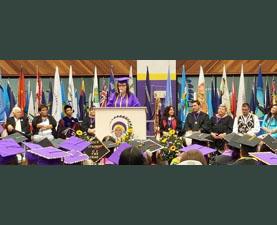
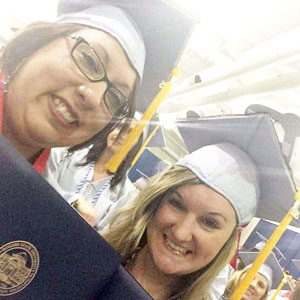 |
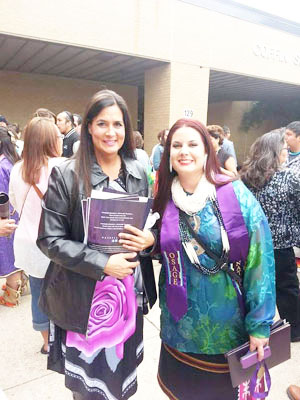 |
| Delaware member, Crystal Thaxton-Dombrovsky, on left. Graduating with a Nursing degree. | Maggie Gray is from our neighboring Osage Nation. Congrats on Graduating from Haskell!!! Pictured with her mother Jennifer here. |
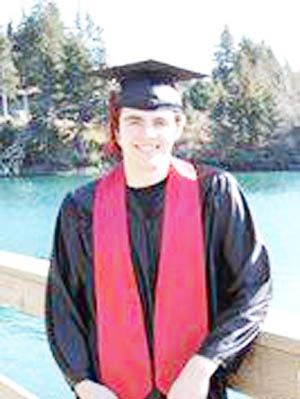 |
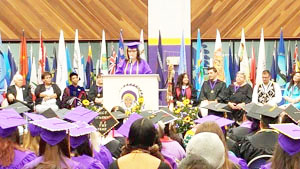 |
| Chance Haller, Valedictorian, Susan B. English School in Seldovia Alaska. | Congrats Delaware member Lori Hasselman, who received her AA in Media Communications at Haskell. She was also awarded Haskell Student of the Year! |
 |
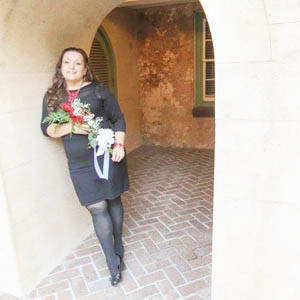 |
| Andrew Dean Humphrey 2015 Graduate of Oologah High School. | Member Myckie Jacobsen graduated from the College of Charleston with a BA in Biology with a minor in Environmental Studies. |
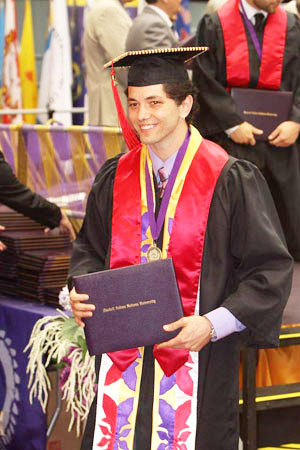 |
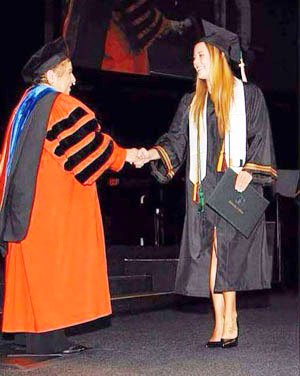 |
| One of our Delawares, Native Studies grad at Haskell. Congrats Bear Tompkins. | Congrats Delaware member Amy Jay Wiley graduates from the University of Miami with a degree of Bachelor of Science in Education with a major in Exercise Physiology and minor in Chemistry. Receiving her degree from President Donna Shalala. |
Lenapeowsi Foundation
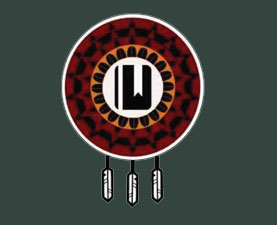

“Lenapeowsi” means to live the Lenape way. The Foundation is a 501(c)3 organization with a mission to preserve, sustain, and perpetuate Lenape language, culture and society. The organization was founded by three Delaware members: John Sumpter, Titus Frenchman, and Nicky Michael. Today, this organization mainly focusses on youth activities. Each year the foundation holds a Christmas Party attended by nearly one hundred people. The Foundation provides Christmas presents to all the children who attend the party. Moreover, each Thursday evening since 2007, the Foundation holds a pot luck and cultural activity as well as language instruction at the Delaware Community Center in Bartlesville, OK. Levi Randoll (Delaware) and Jason Jones (Euchee) volunteer their time and effort to provide this Thursday night activity. Nancy Sumpter and Kay Anderson, both Delaware Elders, attend and provide for the weekly activities. They assure everyone is fed, clothed, and behaved appropriately as most Grandmothers do.
All children are welcome to attend our activities regardless of tribal affiliation. While we focus on Lenape culture, we include other Tribes as well. For instance, some of the kids know how to sing in both Kiowa and Lenape. Cherokee culture is also strongly influential in our area. Last week, the youth attended a stomp dance at the Miami Tribe complex.
The Cherokee Nation, Native Voices Rising, and the Delaware Tribe have all supported the organization with both cash grants and in-kind donations. Our youth also sell t-shirts, wrist bands, and fans to raise money for their field trips and dance attire. If you would like to donate to this organization or purchase items, please call the Chairwoman, Nicky Kay Michael, PhD at (918)766-6299, or submit a check to Lenapeowsi Foundation, 927 E. Portland Ave. Dewey, OK 74029.
The Delaware People’s Historical Presence in Pennsylvania

by Catherine Monck
THE DELAWARE INDIAN NEWS ANNOUNCES SECOND ESSAY WINNER
Congratulations to Catherine Monck, tribal member from Lexington, Kentucky on being our second winner in the essay contest for our youth. A $100 gift will be in the mail very soon to Catherine, and all other youth who sent in essays will be receiving $25 checks. Her essay is reprinted here.
Many people begin the history of the Delaware people around the same time the white settlers arrived in North America. The Delaware people were settled in the area that is now made up of the states of Delaware, New York, New Jersey, and Pennsylvania. They were considered to be one of the two most powerful Native American groups in North America. They lived in longhouses covered in grass and bark. Their language was Algonquin with three different dialects which were Munsee, Unami, and Unalactigo.
In the year 1610, Captain Samuel Argyll went into the area in which the Delaware people lived. He decided to name the area and the people that lived there “Delaware” in honor of his commanding officer, Sir Thomas West III Lord De La Warr, who was also the Provincial Governor of Virginia. This begins the unfortunate decline of the Delaware people. The white settlers were not respectable or understanding of the lifestyle that the Delawares had.
As more white settlers moved into the Delaware area, things began to change for the worse. The Delaware people had never been exposed to the idea of people owning land. They had always believed that “the Creator” owned all of the land, and they simply inhabited it. Yet, the white settlers had different ideas. In the beginning, the white settlers seemed to be relatively fair in their interactions with the Delawares in terms of land transactions. Then, the colonial government began to push for even more settlements and even more expansion. When the Delawares left their villages to go hunting or fishing, the land was viewed as abandoned and consequently taken. This is where many conflicts arose, and then became violent.
The once semi-fair economy began to spiral out of control as the white settlers gained more control. Soon the Delawares were running out of land in the original area to occupy. The colonial government consistently continued to push for more expansion. All of this led to more and more tensions and more clashes.
The last straw for the Delawares and the colonists was the 1737 Walking Purchase. A well-thought-out fraud from the beginning, the Walking Purchase was meant to determine how much land the Penn family (the family who helped settle Pennsylvania) would purchase. The agreement had been created while Thomas Penn was still the patriarch, and was then carried out by William Penn, who was Thomas’ son. The original idea was that the amount of land would be how far a man could walk in a day and a half. Each group of people had three men who would “walk” for them. The white settlers cheated though, training their men how to run for miles for many hours, cutting away underbrush along the way, having horses available to carry their supplies, and even boats to get them across rivers. When the Delawares protested the clearly unfair agreement, the Iroquois were called in. The Iroquois were happy to be involved in the finalization of the agreement, because they felt they had defeated the Delawares in the 17th century, and were pleased to have a title to the land.
After the 1737 Walking Purchase, the Delaware people slowly got pushed out and down south in the United States. The Native Americans and the white settlers could not coexist, and the white settlers had the power. The Delaware people slowly moved down, until many of them settled into what is now modern-day Oklahoma. Many of the living descendants of the Delawares live in Oklahoma and the surrounding areas.
The Delaware people had a difficult time in Pennsylvania. They were oppressed and abused. They were tricked and used by the white settlers. It is unfortunate that they were driven out of their land that they respected and held so dearly. Yet, despite all of these hardships, they still continue to live on and thrive. The culture is still in existence, and that is incredibly respectable.
Sources Cited
- http://www.easterndelawarenations.org/history.html
- http://delawarein.webs.com/delawarehistory.htm
- http://www.tolatsga.org/dela.html
INSPIRE Pre-college Native American Political Leadership Scholarship Awarded

Joey Richard, son of Steven and Ann (Tipton) Richard of Glen Carbon, Illinois, has received a scholarship to the INSPIRE pre-college Native American Political Leadership Program at George Washington University, located in Washington D.C., this summer. INSPIRE scholarships are awarded to students based on evidence of academic ability, leadership potential, and an interest in public service.
The INSPIRE Pre-College Program is a full scholarship open to Native American, Alaska Native, and Native Hawaiian rising junior and senior high school students, who apply and are selected to spend three weeks on the GWU campus learning about intergovernmental relations between tribal governments and the federal government. As a scholar at GWU, Joey will study the process and practice of democratic representation in the U.S., focusing on the interplay between tribal interests and politics and government at the national level. He will closely study how national politics in the electoral and legislative arenas work.
INSPIRE students live on campus and participate in recreational programs with the community of high school students enrolled in GWU Pre-College programs. INSPIRE is funded by a grant from AT&T Foundation.
The INSPIRE application was recently highlighted in the Delaware Indian News January 2015 issue and it was instrumental in Joey’s decision to apply.
Joey is a junior at Father McGivney Catholic High School, Maryville, Illinois. Joey carries a 3.92 GPA and is active in National Honor Society, student leadership, scholar bowl, math team, academic committee, yearbook, soccer, and band. He teaches kindergarten Sunday School and is an active member of the music ministry at St. Mary’s church in Edwardsville, Illinois. Joey worked as an intern on a recent political campaign. Joey is interested in pursuing a business or international relations degree in college and a possibly a law degree.
Joey is the grandson of the late Alice and Virgil E. (Son) Tipton Jr., Springfield, Illinois, great grandson of Lida W. (Woodall) and Virgil E. Tipton Sr., Afton, Oklahoma and is proudly descended from the Woodall, Marker, and Killbuck lines.
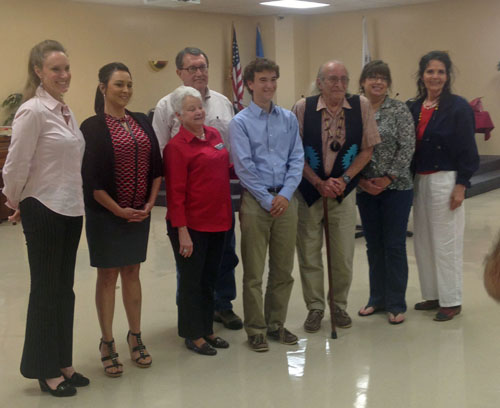 |
New Cherokee Nation Health Center

by Tim Hudson
A delegation of Delaware Tribal officials were recently on hand for an open house for the new Cherokee Nation Health Center in Ochelata, Okahoma.
On May 5, Delaware Chief Chet Brooks, Assistant Tribal Chief Bonnie Jo Griffith , and tribal member Benita Shea were among those in attendance for an open house held at the new $10 million Cooweescoowee (prounounced coo-WEE-scoo-WEE) Health Center, which will serve Natives in northeastern Oklahoma.
The 28,000-square-foot facility is five times larger than the existing Bartlesville Health Center which it will replace, and also offers a much wider variety of services. It is the first of four new health facilities that will be completed under a $100 million health care improvement plan using Cherokee casino profits.
The new health center has 10 exam rooms and offers family medicine, full lab services, optometry, dental, behavioral health, pharmacy with drive-thru, radiology, disease prevention, and more.
“You’ve been a part of us for so long” Principal Chief Bill John Baker said of the Delaware group as he addressed the crowd.
“And we are happy to have you here.”
Delaware Tribe of Indians Chief Chet Brooks says the facility is wonderful.
“It’s a fine looking facility and it will provide all kinds of care,” he said.
“Medical, dental and optometry assistance to our tribal members…. I’m very pleased with the new clinic.”
He says that the clinic’s location is better for tribal members, in that it’s about 10 miles closer than the existing clinic and “will have additional services.”
Assistant Tribal Chief Bonnie Jo Griffith agrees, saying, “We appreciate it being so close and modern.”
“As tribal council members, we are happy the Delaware tribe will be able to use it” she said.
The facility carries historic Cherokee Nation Principal Chief John Ross’s Cherokee name, Cooweescoowee, which is a type of bird. Ross is the longest serving chief of the Cherokee Nation, leading the Cherokees from 1828 to 1866 and across the Trail of Tears. Cooweescoowee is also the name of the northwestern historic district of the Cherokee Nation.
“The health center, and this is true of of all our health centers, is open to any member of any Federally recognized tribe” Cherokee Secretary of State Chuck Hoskin Jr said.
“And any member of the Delaware Tribe may certainly use the health center.”
He says that some of the programs however are limited to the Cherokee Nation’s citizens.
“Some of those programs will only be available to Delaware members who have dual citizenship….if a Delaware is carrying both cards they are eligible for any service.
He says that for more information on which services are available may be obtained by calling the clinic at 918-453-5000.
American Indian and Alaska Native White House Conference on Aging Listening Session

by Tim Hudson
Oklahoma weather and tornados weren’t enough to deter the Delaware Tribe of Indians delegation from a recent conference on Aging Listening Session.
According to Delaware Elder Nutrition Program Leader Allan Barnes, “We did get interrupted by the tornado sirens and were escorted to the designated Storm Shelter safe rooms until the all clear was given.”
The scare happened on May 11, during the 2015 American Indian and Alaska Native White House Conference on Aging Listening Session held in Norman, Oklahoma.
According to the OICOA, (Oklahoma Indian Council on Aging) the event was held in conjunction with the Department of Health and Human Services Region VI & VII Tribal Consultation Session and included attendees from thirty-one Tribal Nations from Arizona, Alaska, New Mexico, and Washington.
Attendees traveled from far and wide to voice their concerns about aging in Indian Country.
During a session with Assistant Secretary for Aging, Kathy Greenlee and Cynthia LaCounte, Director of American Indian/Alaska Native and Native Hawaiian Programs, Oklahoma weather reared its ugly head in the form of a severe tornado warning in the area, sending attendees to seek shelter in the lower levels of the building.
“We were down there for 45 minutes to an hour,” Barnes said.
“No one seemed too ruffled by the idea of a tornado. If anything, there might have been a sense of claustrophobia.”
He says that the safe rooms the attendees were divided into were fairly spacious so there was no crowding and he got the opportunity to visit with several people.
“One lady from Albuquerque said when they had storms they were more concerned about lightning strikes and flash flooding” he said.
Another elderly Indian lady I sat down and visited with, said she was from southern Oklahoma and they would just sit out on the front porch and watch them because she was too old to be worried!”
After the threat had been lifted, Assistant Secretary Greenlee and Director LaCounte graciously resumed to the session and listened to every person presenting testimony until the session’s conclusion at 8:00 PM.
“All of these sessions, meetings, and conferences are very worthwhile and are a benefit to our tribe,” Barnes said.
“Our Delaware Tribe’s history and our origins from the East Coast is a very interesting story to most that don’t know we were one of the tribe’s to greet the first Europeans who came to America.”
He says that he feels like the seminar, even with the storm troubles, was very worthwhile.
“What I took away from the sessions for the Delaware people would be the influential contacts and their offers of assistance to our Tribe, whenever a need existed” he said.
Tribal Compact for Hunting and Fishing Rights

by Tim Hudson
A recent compact between Cherokee Nation Principal Chief Bill John Baker and the state of Oklahoma should have Delaware tribal sportsmen very happy.
The agreement, which takes effect January 1, will expand hunting and fishing rights for the Cherokee Nation, and in turn, Delawares with dual membership, to all 77 Oklahoma counties.
“By creating and signing this compact, we have reaffirmed our tribal sovereignty,” Cherokee Principal Chief Baker said. “I am proud the Cherokee Nation is the first tribe to compact with the state in proper recognition of our long-held treaty rights to hunt and fish the lands within not only our jurisdictional boundaries, but all 77 counties in Oklahoma. No Cherokee will ever be fearful of arrest or prosecution for exercising their inherent rights to hunt and fish.”
“It’s a great thing that they are doing this,” Delaware Tribe of Indians Chief Chet Brooks said.
Overlapping state and tribal jurisdiction are often confusing when it comes to native citizens’ rights to fish and hunt the land without facing unnecessary and unlawful prosecution from state wildlife enforcement officers. According to the Cherokee, under the new compact, citizens will “now be able to freely exercise their treaty rights across the state and without fear of arrest or prosecution off tribal land. The compact is the result of several months of careful negotiation to ensure Cherokee Nation citizens’ rights were not only preserved, but strengthened.”
Delaware Tribe of Indians Council Member Nate Young says the compact is a reflection of tribal sovereignty.
“To have the ability to enter into this type of compact is all about tribal sovereignty,” he said.
“And it’s safer for both the Delaware citizen and for everybody else to not have to worry about being apprehended and having to go through the court system.”
He calls the agreement “win-win.”
“It was the smart and safe thing to do, it’s good for the state and it’s good for us,” he said.
According to Cherokee Nation Secretary of State Chuck Hoskin Jr., Delaware tribal citizens with dual membership over the age of 16 will receive a hunting and fishing license annually and free of charge, along with one deer tag and one turkey tag. Two dollars from each license issued will go to the state in obtaining federal grants to help preserve the state’s wildlife and natural habitats.
“The license will be issued to all of our Delaware that have dual citizenship, whether they request it or not” he said.
“The only thing that will hold that back is a bad address, so everyone needs to make sure that their information is kept up to date.”
Explaining the Standing of the Tribal Court
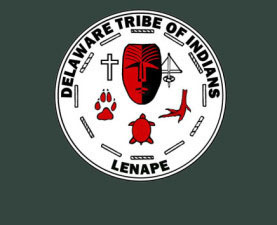
by Tim Hudson
Delaware Tribe of Indians Tribal Council member Nate Young says he wants to talk to tribal members on the matter of the tribal court’s standing with the state district courts.
“I think this is an area that a lot of people are foggy on, and I think it’s worthwhile to discuss where we are and where we stand with the courts,” he said.
According to Oklahoma State records, the tribe was granted “Full faith and credit of tribal courts” on April 6, 1995.
Young says that this means that an order issued by the Delaware Tribal Court shall be recognized by the Courts of Oklahoma. The only event that would negate the recognition is if the losing party can show that the tribal judgment or order was obtained by lack of jurisdiction or fraud.
The Delaware tribe was one of dozens of tribes included in the agreement.
According to the State of Oklahoma’s standards for recognition of judicial proceedings in Tribal Courts, the term “Tribal Court” means “any court or constitutionally established tribunal of any federally recognized Indian nation, tribe duly established under federal law or tribal law.” The standards recognize an officer of the court as “any judge, justice, magistrate or other officer duly seated and authorized under federal or tribal law to resolve disputes and enter tribal judgments in a tribal court.” A judgment is recognized as meaning “any final written judgment, decree or order of a tribal court duly signed by a judicial officer and filed in a Tribal Court.”
“We will recognize the state’s court orders and they will recognize ours” Young says.
“Whether an order or a judgement, this and this also means temporary injunctions….as long as there is a valid order and by that the proper due process.”
He says that tribal court has jurisdiction of “anything dealing with our members and dealing with the tribe itself. “
“The tribal court has jurisdiction over that. There is also the scenario that a matter be dealt with in tribal court and taken to state court to get it enforced” he said.
“It’s really no different than Texas or Kansas recognizing Oklahoma court orders, so we the Tribe are standing on the same level as a state.”
In criminal matters the tribal court does not exercise any criminal jurisdiction.
“But we do exercise civil matters and tribal child welfare matters, the Delaware tribal court has a right to hear any cases involving Delaware children in the case of foster care or guardianship.”
“We really want our people to have an idea of how the Tribal Court system works” he says.
Delaware Child Development Breaks Ground on New Child Development Center

Press Release
June 2nd, 2015
by Tim Hudson

Delaware Child Development Center will be breaking ground on their new Child Development Center June 2nd, 2015 at 2 P.M. The building will be located on Lenape Addition on the Delaware complex at 5110 Tuxedo Blvd, Bartlesville, OK. Delaware Tribal Council Members, Bartlesville Chamber of Commerce, team members, friends, and family will be in attendance for this highly anticipated event. The Child Development Center will be a larger facility than what is currently located on the property. In 1999, the Delaware Child Development Program built their first child care center in Bartlesville with four small classrooms. They quickly outgrew the facility.
The new Delaware Child Development Center will be constructed across the parking lot from the current building and adjacent to the Delaware Child Development Resource and Education Center. The current DCD building will be re-purposed for other needs within the Tribe, including expansion of the elder nutrition program.
The new center will be able to serve 90 children, ages birth through five years, and almost DOUBLE the capacity of the present child care center, which has 47 enrolled and 151 children on the waiting list. The new and improved center will have adequate space to create gardens and other natural outdoor play environments recommended as best practice for early childhood programs. The added outdoor space will allow for an infant playground that will be designed to specifically meet the needs of infants and provide them with a safe outside play environment to explore their surroundings.
“We are looking forward to finally opening a new space for children in Bartlesville that will meet more of the growing need for quality programs for young children. Our teachers are very excited to have added indoor space and to be able to add natural outdoor environments that are so beneficial to children.”
–Sherry Rackliff
DCD Centers use a developmentally appropriate curriculum that provides a structure for teachers to observe children and document their progression of developmental growth and structure classroom experiences that will enable every child in the class to grow and develop to her fullest potential. Observations of the children by the teachers include experiences that encompass the full range of a child’s growth from developing language skills, early literacy, mastering fine motor techniques, exercising gross motor activities, social skills, cognitive development, art, music, and more.
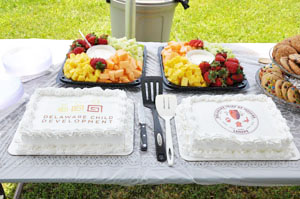 |
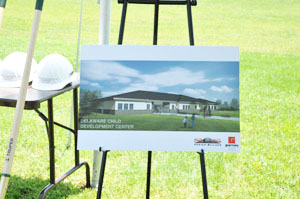 |
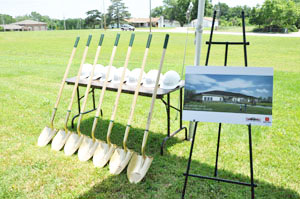 |
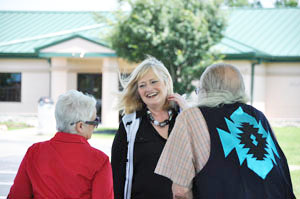 |
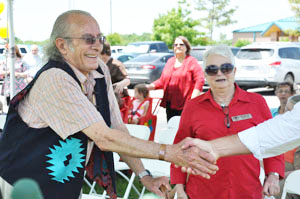 |
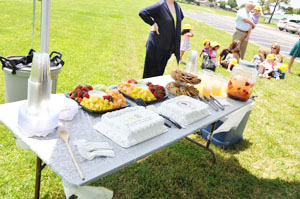 |
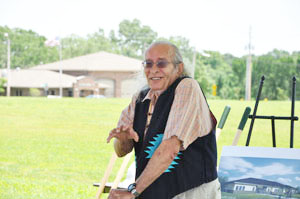 |
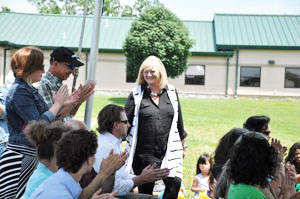 |
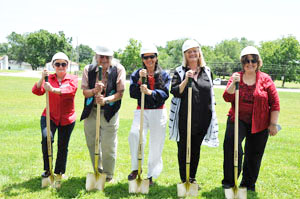 |
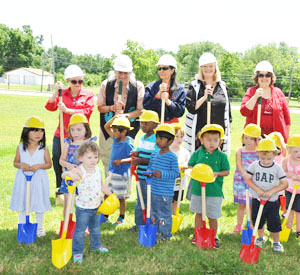 |
 D5 Creation
D5 Creation